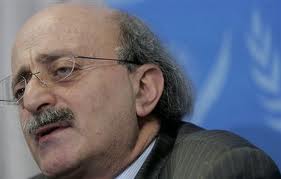 Progressive Socialist Party leader MP Walid Jumblatt who has been acting as a centrist got himself in trouble again with March 14 alliance for trying to reward Hezbollah for its arms.
Progressive Socialist Party leader MP Walid Jumblatt who has been acting as a centrist got himself in trouble again with March 14 alliance for trying to reward Hezbollah for its arms.
He told As Safir newspaper in remarks published on Friday that the collapse of Syrian President Bashar Assad will not make Hezbollah hand over its weapons as the March 14 alliance believes, assuring that the price will not be less than a new Taef Accord.
The Accord, which was negotiated in Taef, Saudi Arabia, was the agreement that bought an end to Lebanon’s 1975-90 Civil War.
March 14 MP Ahmad Fatfat a key member of the Future Movement bloc which is header by former PM Saad Hariri swiftly responded Friday, saying Jumblatt’s comments indicate that there is a “political price for Hezbollah’s weapons.”
“This does not surprise me as Hezbollah is no longer a resistance party but a militia seeking political gains, and this means that Hezbollah is ready to take Lebanon to a long war because the Taef Accord only came after the Lebanon Civil war,” Fatfat told Voice of Lebanon.
“The Hezbollah issue is primarily regional and Iranian and the solution would be part of a regional solution,” he said.
Jumblatt urged urged the Lebanese to rally around President Michel Suleiman’s defense strategy, which aims to resolve the thorny issue of Hezbollah’s weapons.
March 14 coalition insists that Hezbollah be disarmed since it is no longer acting as a resistance organization while the Iranian backed militant group insists it is a resistance and needs its arsenal to defend Lebanon against Israeli aggression.
Economy
Jumblatt voiced concerns over the economic situation in Lebanon, stressing that the risks are comparable to the risk of civil peace. The time of economic boom has gone and we need a policy of austerity. Lebanon needs to save itself, he concluded.
Preventing an economic explosion is the responsibility of all political forces, said Jumblatt, and invited Hezbollah to contribute to saving Lebanon.
The current Lebanese cabinet is dominated by Hezbollah which has been accused of interfering in the internal affairs of the Arabian Gulf countries. For this reason tourists from the Gulf who contribute the most to the Lebanese economy stayed away last summer. Investments from the Gulf also dried up and this has become a great concern for Lebanon as was evident during the last cabinet meeting when Central bank governor Riad Salameh called on the cabinet to find the funds before agreeing to any wage increases

Leave a Reply
You must be logged in to post a comment.